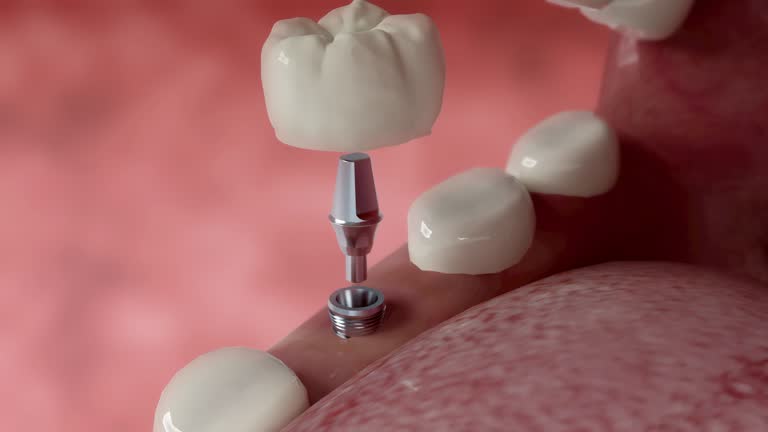Dental implants are known for their durability and longevity, making them a popular choice for individuals looking to replace missing teeth. On average, a dental implant can last 15 to 25 years, and with proper care, some can even last a lifetime. The lifespan of an implant depends on several factors, including the patient’s oral hygiene practices, lifestyle habits, and overall health. Regular dental check-ups and avoiding habits like smoking can significantly extend the life of an implant.
The implant’s longevity is also influenced by the quality of the implant material and the skill of the dental professional performing the procedure. High-grade titanium implants, for instance, are resistant to corrosion and integrate seamlessly with the jawbone. Consistent oral care, such as brushing, flossing, and using antibacterial mouthwash, plays a critical role in preventing gum infections that could compromise the implant’s stability.
How Much Does a 1 Tooth Implant Cost in Pakistan?
In Pakistan, the cost of a single dental implant varies depending on the city, clinic, and the brand of implant used. On average, the price for a single tooth implant ranges from PKR 50,000 to PKR 250,000. Factors such as the dentist’s expertise, the complexity of the case, and additional procedures, like bone grafting, can influence the total cost.
The type of implant system used also impacts the cost. For instance, internationally recognized implant brands may be more expensive but provide higher durability and success rates. Many dental clinics in Pakistan offer payment plans, making this advanced treatment more accessible to patients.
It’s advisable to consult multiple clinics for an estimate and check the qualifications of the dental professionals to ensure quality care. Investing in a reputable implant system and skilled dentist can save long-term costs associated with maintenance or replacements.
What Is a Dental Implant?
A dental implant is a titanium post or screw surgically placed into the jawbone to serve as an artificial tooth root. This implant provides a sturdy foundation for a replacement tooth, crown, or bridge. Dental implants are designed to replicate the natural tooth structure, offering a permanent solution for missing teeth.
The dental implant process typically involves three stages:
- Placement of the Implant: The titanium screw is inserted into the jawbone under local or general anesthesia. Over time, the bone fuses with the implant in a process called osseointegration, which can take several months.
- Abutment Placement: Once the implant is secure, an abutment is attached to connect the implant to the prosthetic tooth or crown.
- Attachment of the Crown: Finally, a custom-made crown is placed on the abutment, completing the procedure.
Dental implants are preferred for their natural appearance, durability, and functionality. They help prevent bone loss, maintain facial structure, and improve the patient’s ability to chew and speak effectively.
How Painful Is a Dental Implant?
The level of discomfort experienced during and after a dental implant procedure varies from person to person. Most patients report minimal pain during the surgery itself, as it is performed under local anesthesia or sedation, which numbs the treatment area. Some may experience mild pressure but no significant pain during the procedure.
Post-surgery, it’s common to feel some discomfort, swelling, or soreness in the treated area. These symptoms are generally manageable with over-the-counter pain relievers, cold compresses, and prescribed medication if necessary. Most patients find that these side effects subside within a few days to a week.
Factors such as the patient’s pain tolerance, the number of implants placed, and the need for additional procedures like bone grafting can influence the overall experience. Following the dentist’s aftercare instructions is crucial for minimizing pain and ensuring a smooth recovery.
In most cases, the long-term benefits of dental implants far outweigh any temporary discomfort. Patients can enjoy restored dental function and aesthetics, contributing to improved overall confidence and quality of life.
Why Does My Dental Implant Hurt When I Chew?
Experiencing pain while chewing with a dental implant can be concerning and may indicate an underlying issue. Here are some possible reasons why your implant might hurt:
- Improper Bite Alignment: If the crown on your implant is not properly aligned, it can create uneven pressure when chewing, causing discomfort. Your dentist may need to adjust the crown to ensure proper fit and alignment.
- Peri-implantitis: This is an infection of the tissues surrounding the implant. It can lead to inflammation, pain, and even bone loss if not treated promptly. Maintaining good oral hygiene and seeking immediate dental care can help manage this condition.
- Overloading: If excessive force is applied to the implant during chewing, it can strain the surrounding bone and tissues, leading to pain. This is more common in individuals who grind their teeth or clench their jaws.
- Nerve or Tissue Damage: In rare cases, the implant placement may affect nearby nerves or soft tissues, causing pain. If this occurs, consult your dentist immediately.
- Bone Integration Issues: If the implant has not fully integrated with the jawbone, it may feel loose and cause discomfort while chewing. Additional procedures or adjustments might be needed to resolve this.
If you experience persistent pain when chewing, schedule an appointment with your dentist as soon as possible. Early intervention can prevent complications and ensure the success of your dental implant.
Dental implants are a reliable and effective solution for individuals dealing with missing teeth. Whether you’re curious about their durability, cost in Pakistan, or the process involved, consulting with a qualified HASH CLINICS dental Dentist in Karachi professional is the best way to determine if this treatment is right for you. With proper care, dental implants offer a lifetime of benefits, transforming both oral health and self-confidence.



